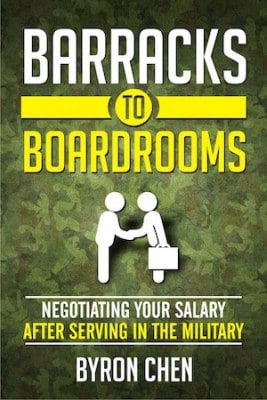Table of Contents
Since leaving the Marine Corps, I’ve been on a mission to pass on the most important lessons learned from other veterans who have successfully made the transition. This is why I started SuccessVets.com, a transition resource site that helps service members with their careers and lives after the military.
Some of the most frequent questions I get from the audience of my blog and podcast concern salary negotiation. That’s no surprise to me since this subject is left mostly uncovered by transition assistance counselors. But it should be something that veterans learn before entering the private sector. Beyond finding gainful employment after the military, negotiating your salary may have the biggest impact on earnings in your lifetime.
“Not negotiating…can be more costly than you think. In their paper ‘Who Asks and Who Receives in Salary Negotiation,’ researchers…found that employees who negotiated their salary boosted their annual pay on average $5,000.
According to the researchers, assuming a 5% average annual pay increase over a 40-year career, a 25-year-old who negotiated a starting salary of $55,000 will earn $634,000 more than a non-negotiator who accepted an initial offer of $50,000.”?- Camille Sweeney and Josh Gosfield in Fast Company, 2013
In the military, nobody has to negotiate their salary. Compensation is public information, so you can figure out what someone makes with a quick Internet search and some back-of-the-napkin calculations.
In the private sector, however, getting paid fairly and adequately for what you do is something in which you can take some control. This can be nerve-wracking. For someone with no experience at this, it can feel like you’re in over your head, which is why many people convince themselves to trust their employers and leave their compensation up to the goodwill of others.
On the other hand, being able to lay claim to what you deserve can be exhilarating. Unlike the military, you aren’t paid the same as everyone else in your peer group. You can demand, in a reasonable manner, fair compensation for the outstanding work that you do.
Here’s what you need to know to negotiate your job offers effectively:
Getting Paid Fairly is Your Responsibility
There’s an assumption in the military that the organization will take care of you. In the private sector, the bottom line drives all incentives. While companies will pay more to attract and retain talented employees, they won’t go out of their way to give everyone a great offer.
What they do is hedge their bets. Most employers budget flexibility into their contracts. If the employee accepts, great! The company just saved money. Don’t let your employer get you at a discount. Be sure to confirm whether the offer is within the range of compensation of others in the same industry and position.
Do Your Homework – Know your Worth
Employers will not be transparent with you. Salaries in the private sector aren’t usually public information. In a Salary.com study, over a quarter of the people surveyed did not know the industry standard for their position. I bet this percentage is even higher if you poll recently transitioned service members. I can tell you I had no clue when I first got out. I just trusted the salary ranges on the job position postings. This ignorance is a critical mistake that can be easily corrected.
How to Compare Salaries
There are several sites like the Bureau of Labor Statistics, Payscale.com, Salary.com, Glassdoor.com, Visadoor.com, and others that have collected salary information from various industries and positions. I also recommend reaching out to people in the industry for informational interviews and to have a conversation about compensation, in general.
The Bureau of Labor Statistics (BLS)
The Bureau of Labor Statistics, or simply “BLS” is a United States government agency. The website is likely the most comprehensive employment database in the US and a major source of information for other employment databases.
The advantage of the BLS website isn’t just the data that it provides, but the incredible detail of that data that is available. For example, the site will provide salary data based on the region of the country you live in, including what is available in specific metropolitan areas. This is significant because salaries from one metropolitan area to another can vary to a surprising degree.
You should also check out the BLS Occupational Outlook Handbook. It offers information on salaries, especially in regard to the future outlook for various careers and jobs. This will include rating job classifications on a relative basis. For example, the outlook will rate job prospects in a given occupation compared to national employment overall. It will do this by rating growth in a field as average, above average, below average, or some other descriptive term.
If you’re looking for a raise in your pay, you should consider the outlook for that career. If the prospects are better than average, your case for asking for a raise will be stronger than if it’s below average.
Salary.com
Salary.com is quite possibly the most popular salary guide around. The salary wizard is easy to use, and you can refine it down just about as far as you want.
One limitation I find is that the job descriptions tend to be somewhat generic. For example, if you search for “accountant”, you will get results for titles such as “Accountant I”, “Tax Accountant III”, or “Financial Reporting Accountant II”. Those sound like internal corporate accounting descriptions, rather than the many diverse job titles that you will see in the real world. But like I say, you have to get as specific as possible in describing your position, and you may even have to improvise by going with the available job title that comes the closest to describing your position.
You can get plenty of information from the free version, including salary range, but the deeper information is available by paid subscription
Payscale.com
Payscale is a more cumbersome system to use than most others. You have to complete information on several screens, after which it will ask you to establish an account and collect your email to send your report. The information is very specific, but it is neither quick nor does it give you the ability to adjust the details.
The upside is that if you complete the survey honestly, you will have a report that you may be able to take back to your employer to support your request for more money. If however, you are looking for a general salary range, you’ll be better off using other sites.
SalaryExpert.com
If you are on the higher end of the salary range, you may want to check out SalaryExpert. The site is aimed primarily at executives in upper management.
The site also provides far more information than just salary range. Like the BLS website, it also provides enormous information on regional employment, including salary ranges in various metro areas. It also provides information on career research, including future projections of what your income will be in a given job classification.
CBSalary.com
The CBSalary site is CareerBuilder’s salary tool. The tool is quick and easy to use, and you can change details and locations as many times as you want. But since CareerBuilder is first and foremost a job board, the site is set up to get you to use it to conduct a job search, not necessarily a deep dive into the finer points of your current job or career field.
Use this information to set your expectations and goals when you do your job search. Also, use it to check that the employer is offering a fair compensation package.
Communicate Your Value
Your ability to highlight the skills and experiences that you bring to a company has the most impact on negotiating better compensation according to a CareerBuilder survey. A company shouldn’t be paying you less “because you’re a veteran.” Doesn’t that sound crazy just reading it?
They should pay you less if you don’t have the ability to fulfill what the job requires. The problem most companies have in hiring veterans isn’t that veterans aren’t skilled enough to do the job, it’s that employers don’t understand how those experiences translate to the private sector.
If the compensation being offered to you is lower than expected, it’s likely because you haven’t communicated how well you fill the company’s needs. Make sure that when you do talk about your accomplishments and capabilities you clearly associate which problems and job requirements those are fulfilling for your employer.
Your military background can be difficult for a civilian to decipher, and the onus is on you to get them to understand where your skills fit. But once you do, you put yourself in the same “pay grade” as anyone else they would hire for the position. Don’t assume that the offer you get accounts for all the talent you bring.
Your Recruiter Will Not Do it For You
The only person who will truly want to negotiate your salary is you. If you, like many transitioning veterans, work with a recruiter to get your job, you might assume that he will work to get you your highest salary. It would be reasonable to assume this, since many times, the recruiter’s commission is based on the salary you receive from the employer. But the incentives for recruiters to get the highest possible offer for you are not aligned with yours.
The authors of the book Freakonomics detail a similar relationship between homeowners and their real estate agents. Studies showed that real estate agents, on average, accepted lower offers for their clients compared to when agents sold their own properties. This is because the extra effort required for agents to sell someone else’s home does not result in a significant enough difference in commission to do so. After all, they only make a percentage of the deal. That extra effort isn’t worth it if they can make more by closing more deals.
In no way am I saying that recruiters or real estate agents are being dishonest. But realize that you have much more at stake when it comes to negotiating a salary offer than the person working as your agent. If you have a recruiter as a buffer, you have to push him to get the best offer for you or do the negotiating yourself.
Ask, and You Will Open Doors
Bad things don’t happen when you ask. But it does give the opportunity for good things to happen.
There is a lot of fear-mongering over salary negotiation. I hear this argument a lot – “In this economy, you should work hard and prove invaluable to your company. Then you’ll get paid.” The problem with this line of thinking is that it ignores reality and research.
Salary raises during your career fall in a very narrow range, usually 2-5%. Companies do this for a variety of reasons, including aligning their budgeting and accounting, maintaining pay differences for positions within the company, and knowing that most people are afraid to counter for more. Notice that none of these are based on paying someone for the value they bring to a company.
On top of that, your future bonuses and job offers are often based on what you made previously. Negotiating your initial job offer makes the most difference in your long-term earnings. What else does that statement get wrong?
Well, as I mentioned before, most employers budget room into their initial offers, which means you would be getting paid less than you could if you accepted an initial offer. So make sure you ask, or you may be leaving money on the table. An employer may say no to your counter, but that’s the worst of it. Be professional and courteous in your dealings and your employer will treat you the same.
Provide a Solution to the Negotiation
Not all employers are willing to flex on salary. That doesn’t mean you are out of luck. Before your employer shuts down the negotiation, ask if they would compromise on other terms of your contract. That same CareerBuilder survey found that a majority of employers are open to offering flexible schedules, more vacation days, telecommuting, or even paying for mobile devices. Be creative! These little things can make a big difference in your quality of life and can move the negotiation forward if your employer balks on salary figures.
Confirm Everything in Writing
I may come off sounding paranoid, but don’t trust your future employer with abandon, even once you’ve finished negotiating. If you’ve come to an agreement with your employer, make sure to get confirmation of all terms in writing, even if it is only via e-mail.
One friend of mine joined a company after his new boss promised him some bonuses throughout his first year at the company. Due to some quirk in the hiring process, this wasn’t documented in his original contract, but my friend was told that it would be added later on.
Unfortunately, the hiring manager was let go from the company before this could happen. It took my friend another nine months of going back and forth with HR, showing them e-mails of these commitments before he finally got those bonuses. I wouldn’t recommend starting a job until the contract is in place. If you go to work for the President of the United States or this is a once-in-a-lifetime opportunity like that, I’d say fine, let it go. In all other situations, be wary.
Veterans shouldn’t be afraid to negotiate employment offers when they go from the public to the private sector. After researching for nearly a year to put together a book on salary negotiation for veterans, I am confident that most would benefit and be successful in getting a higher salary if they put in the work to prepare. Like interviewing, networking, or putting together a resume, negotiation is a skill that you can develop. It could be the most important thing that isn’t taught when you are separating from the military.




Comments:
About the comments on this site:
These responses are not provided or commissioned by the bank advertiser. Responses have not been reviewed, approved or otherwise endorsed by the bank advertiser. It is not the bank advertiser’s responsibility to ensure all posts and/or questions are answered.
JRS says
So looking into the JROTC jobs they base salary on your difference between retired pay and active duty pay. So a SMSgt with 28 years of service is hired and a SMSgt with 20 years of service who also took Redux gets paid significantly less based upon his increase take of retirement pay.
Doesn’t that violate Vet Protection rules that prohibit employers adjusting pay because we get a retirement check?